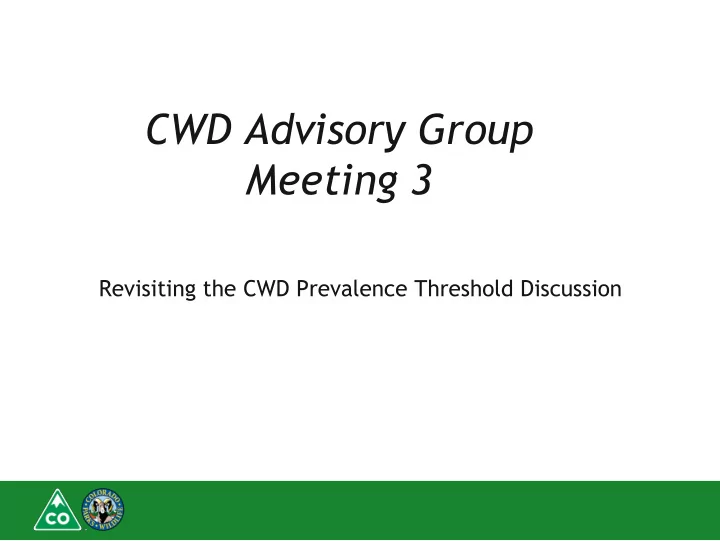

CWD Advisory Group Meeting 3 Revisiting the CWD Prevalence Threshold Discussion
Thresholds for chronic wasting disease management Estimating CWD Impacts on Doe Survival Simple calculation (back of envelope literally)* Based on Colorado field data doe infection rate ~ ½ buck rate ~ ½ infected individuals die each year (either sex) *(originally calculated on a bar napkin…)
Thresholds for chronic wasting disease management Estimating CWD Population Impacts Driven by impaired doe survival “Healthy” doe survival ~85% (‘CWD - free’) CWD losses further reduce doe survival ~85% (annual disease loss) Sufficiently low doe survival will depress herd trends
Thresholds for chronic wasting disease management Suggesting a 10% prevalence threshold for adult bucks Here’s the math: prev buck 2 2 = added loss doe 10% 2 2 = 2.5% 85% 2.5% = 82.5%
Thresholds for chronic wasting disease management Why use a 10% prevalence threshold? At the 10% prevalence threshold (adult bucks), affected herds would begin to decline.
Modeled Effect of CWD--Base Vital Rates Fawn: Doe ratio — 55.8 fawns per 100 does (statewide 3 year average) Fawn survival — 68.1% (statewide average) Yearling survival — 84% (Assumed CWD free) Doe survival — 84% (Assumed CWD free)
Conclusions Assuming Starting Point of 84% Doe Survival and CWD Free With CWD, population starts to decline Sustainable doe harvest becomes increasingly difficult At 4% adult buck prevalence, doe population declines by 7% over ten years, IF adult buck prevalence stays at 4% Increasing CWD prevalence leads to steeper declines
Threshold Rates 5% vs 10%: Pros and Cons
Recommend
More recommend